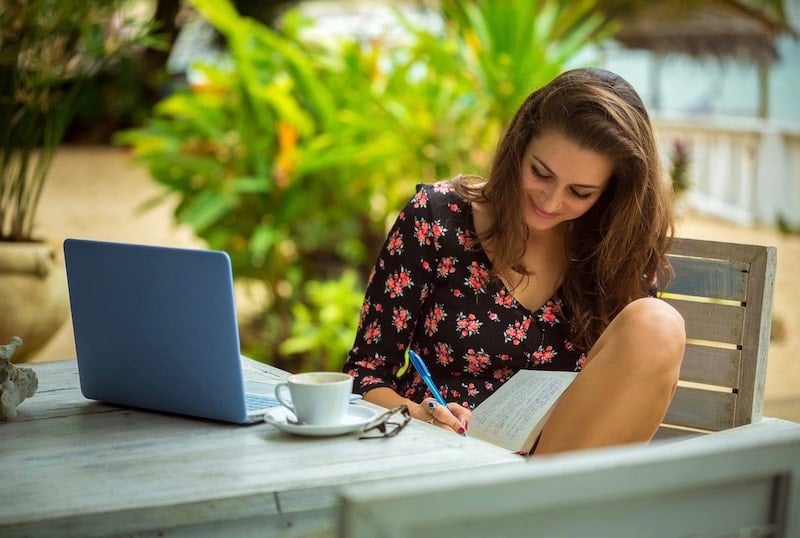Intercultural Learning: How It Can Cultivate Immersive Travel & A Kinder World
Intercultural learning allows us to develop our cross-cultural skills and is something we should all prioritize.
Engaging in intercultural learning can lead to a more immersive travel experience for the traveler — as well as a kinder world.
In this post — part of the Jessie on a Journey “Inspiring Travelers Series” — Lena Papadopoulosa shares some incredible insight into why and how.
Lena is a Greek-American intercultural consultant whose experiences have taught her that our cultural conditioning can divide us from others.
This can have a negative impact in a number of ways. For travelers, in particular, it can hinder the ability for travel to be truly transformative and can keep you from making meaningful connections with locals.
 Just a sampling of what you’ll learn after digging into this mindset-shifting interview includes how to:
Just a sampling of what you’ll learn after digging into this mindset-shifting interview includes how to:




PSST, DON’T FORGET TO PIN THIS POST FOR LATER!
 Just a sampling of what you’ll learn after digging into this mindset-shifting interview includes how to:
Just a sampling of what you’ll learn after digging into this mindset-shifting interview includes how to:
- Know if you’re objectifying the cultures you visit (and how to stop doing it)
- Let locals tell their own stories (and common phrases you may be using that stop them from doing so)
- Handle cultural differences on the road (even when you feel morally-opposed to what you encounter)
- Use travel to create a more just, inclusive and kind world (hint: it’ll make for a better trip experience, as well)
- Understand the dangerous impact of remaining unaware of your cultural conditioning (and how to become more aware)
How To Have A Transformative Travel Experience [Video]
Prefer Video? Watch the Facebook Live version of the interview above! By the way, I go live regularly with travelers who have inspiring stories to tell. If you’d like to get updated on future Facebook Live events, click here to join my email list. You’ll snag my #BeyondTheGuidebook newsletter — full of stories and ideas for having unique travel adventures — as well as updates on fun online and offline events for travelers.
Intercultural Learning & Immersive Travel Q&A
1. Thank you so much for taking the time to do this interview. To get started, can you tell us a little bit about yourself?
I was born and raised in small-town South Carolina. My parents immigrated to the United States from Greece, and we’ve visited Greece for one-to-two months nearly every year since then. Growing up between two cultures played a large role in my identity and lived experiences; it also laid a lot of the foundation for my love of travel. I’d spent most of my life wanting to be an architect, but I had a change of heart the summer before university. I studied Sociology and Psychology instead. I also lived in an apartment complex designed to facilitate cultural exchange between domestic and international students. This experience had a profound impact on me. I began to pursue more opportunities to learn about different cultures and worldviews through meaningful travel, and I later got my Master’s in Cultural Anthropology with a Certificate in International Development Studies. I went on to work for an organization based in Asia, where I designed and facilitated experiential learning curricula and leadership development programs for international schools around the world. I later returned to the U.S. where I spent a few years running intercultural exchange programs and teaching intercultural communication courses at a major public university in Florida. Moreover, I recently launched my own business, and I now travel full-time as a location-independent intercultural consultant and coach.2. You’ve had the unique experience of growing up as a Greek-American split between two cultures. What was that like, and how did it shape you as a person?
I often found myself struggling to navigate who I was and where I belonged. I wasn’t American enough in the U.S., and I wasn’t Greek enough in Greece. I was in this weird in-between, and I always felt out of place and misunderstood. This feeling of “otherness” often lent itself to a victim mentality, but I now see it as one of my greatest strengths. Growing up between two cultures has allowed me to cultivate more empathy, adaptability, and resilience. My early exposure to different cultural values and norms also made me much more aware that our realities are constructs, and we’re the products of those constructs. [socialpug_tweet tweet=”‘I wasn’t American enough in the US and I wasn’t Greek enough in Greece. I was in this weird in-between, and I always felt out of place and misunderstood.’ -Lena Papadopoulos #InterculturalLearning” display_tweet=”‘I wasn’t American enough in the US and I wasn’t Greek enough in Greece. I was in this weird in-between, and I always felt out of place and misunderstood.’ -Lena Papadopoulos #InterculturalLearning”] We’re culturally conditioned to think and behave in certain ways. Our programming results in our inner struggle between who we truly are and who we’ve been taught to be, and I believe this inner turmoil manifests in the attitudes, biases, behaviors, and systems that serve to separate and divide us from one another. I center my work around this idea because I believe becoming more aware of how we’ve been shaped by culture — while also unlearning and relearning what we’ve been taught — is the first step to cultivating a more just, inclusive, and equitable world.
3. We’ll be diving into intercultural learning, so before we start discussing, can you provide a definition of intercultural learning?
Intercultural learning is the process of developing the knowledge and skills needed to engage appropriately and effectively across cultures. The goal of intercultural learning is to work toward:- A deeper self-awareness and understanding of how we’ve been shaped by our cultural context
- An increased awareness and understanding of how others have been shaped by their cultural context
- The ability to mindfully adjust our attitudes and adapt our behaviors when engaging with cultural difference, i.e. to effectively bridge the gap created between our cultural conditioning and the cultural conditioning of others
4. As you explained to me, intercultural learning is a great tool for maximizing the transformative power of travel. Can you share a personal example?
We often speak of travel as though its an inherently transformational experience. I disagree. I believe it’s transformative — meaning that it has the potential to lead to transformation; but, whether or not we realize that potential depends on the choices we make around why and how we travel. I’ve seen many avid travelers remain closed to other worldviews, oftentimes using what they observe as evidence to justify their own prejudice and bias. Travel’s potential to transform largely depends on how we approach the experience. Intercultural learning maximizes travel’s transformative potential because it increases awareness of ourselves, others, and gives us the tools needed to bridge that gap. When we approach any kind of cross-cultural engagement or intercultural exchange with more awareness, we are more open to the learning, growth, and change that’s possible through that encounter. Because of my own background growing up between cultures, as well as the intercultural experiences I had in university — both examples of intercultural learning opportunities — I was very open to learning about cultural differences in my travels. I was also intentional about learning from the various people I met. This allowed me to become more aware of how I’d been unknowingly influenced by my own cultural environment. After my first stint living abroad, I realized my devotion to one particular religion didn’t fully align with the new perspectives I’d adopted, and I made the decision to step away from that part of my identity. During another experience volunteering abroad, I became acutely aware of my own problematic mindset and how I was playing into neocolonial systems of privilege and power. I would not have been open to these realizations if I’d been operating through my own ethnocentric lens, a lens largely shattered by the process of intercultural learning. [socialpug_tweet tweet=”Have you heard of #InterculturalLearning? Here is what it is & how you can use it to have more #TransformativeTravel experiences. #thisissustainable” display_tweet=”Have you heard of #InterculturalLearning? Here is what it is & how you can use it to have more #TransformativeTravel experiences. #thisissustainable”]5. For travelers who haven’t had many intercultural learning experiences, where would they start their research to find these?
Intercultural learning is an ongoing process that we can work toward in so many different ways, and travel isn’t necessary to facilitate these experiences and skills! I always recommend people start with developing more self-awareness as it’s one of the most important aspects of appropriate and effective cross-cultural engagement. One of my favorite ways to cultivate greater self-awareness is through assessments like 16Personalities. I’ve also created a free workbook full of reflective questions and exercises to get us thinking about how our cultural context has shaped our life experiences, personal values, and even the stories we tell about our lives. One of the easiest ways to start learning about different cultures is to seek out books, movies, foreign media outlets, and documentaries that expose you to other perspectives and ways of life. For example, you can visit this link to find 100s of book recommendations from nearly 200 countries. Another way to engage in intercultural learning is to cultivate exploration. When we become too accustomed to a particular routine, our brains become wired with a certain set of expectations. It can be jarring, unsettling, and overwhelming when things don’t go as planned. Creating space for the unfamiliar helps us develop resilience. People who consistently strive to experience new things are usually more successful in cross-cultural interactions because they’re more prepared to respond to differences in effective ways. Those who are comfortable only with what they already know have a difficult time accepting unfamiliar attitudes or behaviors. [socialpug_tweet tweet=”Learn how to truly engage with local #cultures while #traveling & have more meaningful trip experiences. #thisissustainable” display_tweet=”Learn how to truly engage with local #cultures while #traveling & have more meaningful trip experiences. #thisissustainable”] Alternatively, you can pursue more “formal” types of learning opportunities — like courses. Personally, I think everyone should take some sort of intercultural communication class, whether or not they plan to travel. FutureLearn offers a great free online course. I also provide consultations and coaching to support people in developing appropriate and effective intercultural skills that can be applied to any context.6. How can travelers ensure they’re engaging with cultural communities in respectful, mutually-beneficial ways?
We have a tendency to view culture as an object—we think of it as a “thing” we experience. The problem with perceiving culture in this way is that it becomes a static entity removed from its dynamic historical, political, and social context. When we speak of Cuba as a place “stuck in time,” for example, we effectively erase the many factors that have contributed to Cuba’s current context, as well as the stories and lived experiences of Cubans themselves. When we objectify culture, we tokenize the people within it. This is largely why many travelers may not give a second thought to taking photos of people abroad—we come to see the individuals we encounter as representatives of the thing — aka: culture — we’re there to “experience.” We’re not mindful of the implications or impact of taking the photo because we’ve unconsciously dehumanized the subject of the photo. The first step to engaging with cultural communities in respectful ways is to develop the aspect of self-awareness I addressed earlier. When we increase our awareness of the complex, covert ways we’ve been shaped and molded by our own cultural environment, we also become more aware of the complexity of the places and communities we visit. The more aware we become of this complexity, the less prone we are to treat culture as a historical, timeless, and homogenous object of experience. When we stop objectifying culture, we treat the people we meet as individuals with lived experiences as opposed to inadvertently viewing them as artifacts of culture. [socialpug_tweet tweet=”‘The problem with perceiving #culture as an object is that it becomes a static entity removed from its dynamic historical, political, and social context.’ – Lena Papadopoulos #InterculturalLearning” display_tweet=”‘The problem with perceiving #culture as an object is that it becomes a static entity removed from its dynamic historical, political, and social context.’ – Lena Papadopoulos #InterculturalLearning”]7. How can travelers take their interactions with locals to a deeper level in a natural, comfortable way?
This builds on the previous point about treating people as individuals rather than as cultural representatives. Seek to understand and learn from people’s unique perspectives and experiences, and be mindful of how you approach these types of conversations. For example: If you’ve met someone with refugee status and would like insight into their experience, avoid making statements or asking questions that define that person’s experience for them, like “You must be so lonely and sad after that experience”. This statement assumes you understand how this individual feels and it potentially feeds into stereotypes of the refugee experience as a whole. Explore curiosity instead. Open-ended statements like “Tell me more about your experience”, or questions like “How does it feel to be here?” give people the opportunity to tell their own story in a way that feels comfortable and true for them. We have a tendency to project our own assumptions and judgments onto others when we’re trying to understand life experiences that might not reflect our own, and this can sometimes offend or alienate the people we want to get to know.8. How do you recommend travelers handle situations when they find themselves interacting with a local who expresses cultural beliefs they morally oppose?
We have to be mindful that our values and notions of morality are heavily shaped by our cultural context and conditioning, as are the beliefs and values of those we’re interacting with. Because cultural beliefs are shaped by the complex interplay of so many different factors — such as history, migration, politics, and religion — it can be difficult to fully grasp the trajectory that led to that belief. Though coming up against beliefs we morally oppose may evoke a lot of heated emotions, we should always do our best not to approach this interaction from a place of judgment. Get curious. First, seek to understand the role that belief plays in people’s lives and why it’s important to them. [socialpug_tweet tweet=”Tip for #InterculturalLearning: Get curious. Seek to understand the role that belief plays in people’s lives and why it’s important to them. – Lena Papadopoulos #thisissustainable” display_tweet=”Tip for #InterculturalLearning: Get curious. Seek to understand the role that belief plays in people’s lives and why it’s important to them. – Lena Papadopoulos #thisissustainable”] Then, open the door for dialogue; for instance, by saying something like “In my culture, we believe this instead. What do you think about that?” Approach this situation as an opportunity to exchange ideas and avoid the temptation to correct or educate others based on your own values and beliefs. No matter how open-minded we may be, we’re almost always unconsciously approaching situations through an ethnocentric lens because our own attitudes and beliefs are so deeply ingrained and normalized. We are neurologically wired to see our way as the “right” way while judging the unfamiliar. We’re also unaware of how our own beliefs may be perceived as “backward” or “immoral” by others. If you find cultural differences around values/morality difficult to navigate, I’d encourage you to read “Body Ritual Among the Nacirema” by anthropologist Horace Miner, and then Google what the article was written to represent. It will give you a lot to reflect on in regards to how your cultural values may be perceived from the outside looking in.
9. Are there any common mistakes you see travelers make when interacting with other cultures?
One of the most problematic mistakes we make ties in to our tendency to treat culture as an object. By “exploring” or “experiencing” this thing called culture, we draw inaccurate conclusions, make blanket generalizations, and state surface-level interpretation as fact. We may visit a place for a week and think we’ve understood something about its “culture” and somehow believe we have the authority to speak on that “understanding.” But the longer we spend in a place, the more we realize how little we understand because we become increasingly exposed to its nuance and complexity. People who spend 20-30 years in a culture different from their own often say they understand less about it now than they did in the beginning because at that time they thought they understood things they really didn’t. Another common mistake is our tendency to impose our own viewpoints in an attempt to “help” people. I often see travelers and expats try to build organizations or establish initiatives that are meant to “better” local people’s lives, but more often than not, the local people who will be impacted by these efforts haven’t even been included in the conversation. Deciding what people need without including them in that decision is deeply colonial.






Hi, I’m Jessie on a journey!
I'm a conscious solo traveler on a mission to take you beyond the guidebook to inspire you to live your best life through travel. Come join me!
Want to live your best life through travel?
Subscribe for FREE access to my library of fun blogging worksheets and learn how to get paid to travel more!
Turn Your Travel Blog Into A Profitable Business
Subscribe to my email list to snag instant access to my library of workbooks, checklists, tutorials and other resources to help you earn more money -- and have more fun -- blogging. Oh, and it's totally FREE! :) // Privacy Policy.